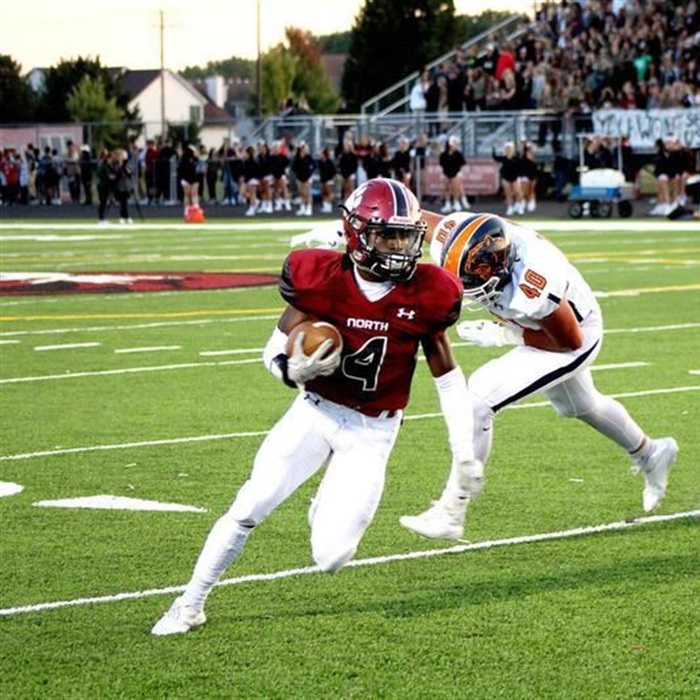
Why College Football Coaches Love Track Athletes
As I watched my number two runner leave early in his 4×1 exchange and I saw the white flag go up (I thought for sure we we’re out of the zone), I started thinking about the trackingfootball.com website. This is the website that connects track and football, providing verifiable track metrics to NCAA and NFL football coaches. The website correlates track times with football success (a concept I strongly agree with and a primary reason why we started TFC and why so many NFL strength coaches attend). It’s usually people owning weight rooms, old school football coaches, or 7-on-7 companies that discredit this concept and it usually leads to some kind of social media war. My mind returned to the track meet and more importantly to my athlete who left early after we practiced the exchange for weeks, in all different scenarios, climate, wind, emergency, etc. I asked what happened, and he said he got nervous. Here is an athlete who won multiple state track medals, played two years of varsity football, and has received Big Ten football offers, yet he got nervous at a Sectional meet that had around 300 parents watching on a cold, rainy Friday night. He got nervous. That’s when it dawned on me that maybe there’s more to the football-track connection than the fact that a great 100-meter dash time translates to a great 40-yard dash time which translates to excellence on the football field. We all know that fast guys make plays, but maybe there’s something more.
In team sports, it is easy to hide, deflect blame, or find reasons other than yourself for things not going well. In football there can be ten other guys that may have screwed up and led to another player’s mistake. And there’s always the next play, where an athlete can redeem themselves and possibly get others to forget about the previous play. Or, even worse yet, it’s easy to blame the coach. “The coach screwed me. He plays favorites. My 7-on-7 coach said I should be a starter or even All-State”. Then the parents jump in. What parent doesn’t want to side with their child, especially when their dreams are not going to come true and they’ve invested so much money and time. It certainly can’t be their kid’s fault. They worked so hard in the off-season, it just not fair. While Uncle Rico was great in Napoleon Dynamite, sometimes comedy is better when it’s close to the truth. Maybe there’s a reason why MLB is one-third Latin American, and the minors are almost 50%. Those players generally don’t carry the same baggage.
Maybe there’s something to be said about playing an individual sport. Maybe an athlete becomes more resilient when there’s no one to blame but themselves for a goal not achieved or a loss. When you lose a race, there’s nowhere to hide. The winner turns and looks you in the eye. Maybe it’s failure that fuels better training. Maybe failure initiates a learning process, a self-realization. This response to failure builds a resilient competitor. Champions are fearless.
Dealing with the pressure of track and field is intense. My mentor, Hall of Fame track coach from York HS, Stan Reddel, used to say that individual sports are the best training grounds for students. Where else in your high school education do you learn to deal with that kind of pressure? It would be like a teacher standing over the top of a student taking a test. It just doesn’t happen. In the real world, we expect people to handle the pressure. We expect them to make good decisions when the stakes are high. These expectations may be forced on people who have no prior experience under pressure. Maybe NCAA and NFL coaches like the fact that track athletes know how to deal with pressure and in most cases excel when the stakes are high. If it is 3rd and 10 in front of 60,000 fans, I am sure a football coach wants someone who performs under pressure. Sprinters who stand by their blocks in front of 25-thousand people at the state meet understand pressure. Only one sprinter will win the race. The others will lose.
Maybe there’s something to be said for the athlete who can stand at the starting line with the self-confidence to win. I see athletes who like to talk the talk but when asked to step to the line they back out. They fear they will be exposed and won’t live up to their reputations. Standing on the starting line, willing to put in all on the line takes courage. Maybe the courage of a sprinter is what football coaches like. Maybe courageous confidence allows an athlete to become a force, a game-changer. We have seen that courageous confidence this year in Illinois with Marcellus Moore. Several of the state’s best sprinters have fallen apart when competing against Marcellus. Every coach is looking for a game changer. Game changers are built by thriving in high-stakes competition. Courage is not a byproduct of making the 300-pound bench club with a healthy spot.
The obvious connection between track and football is the empirical data. Measured speed and measured distances are verifiable indicators of future football success. But maybe, just maybe, the most important connection can’t be measured. Maybe the most important connection is an intangible. Maybe the ability to overcome fear, to compete with recklessness, and to perform in pressure situations are the most important carry-overs from track to football. Champions compete.

